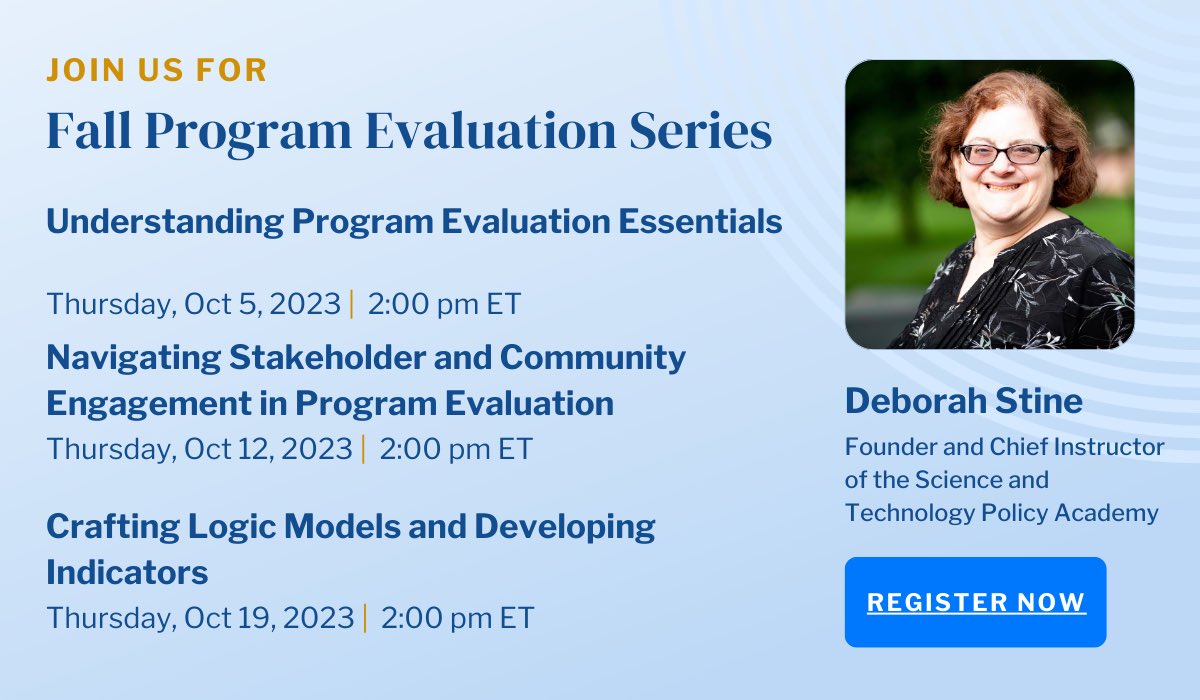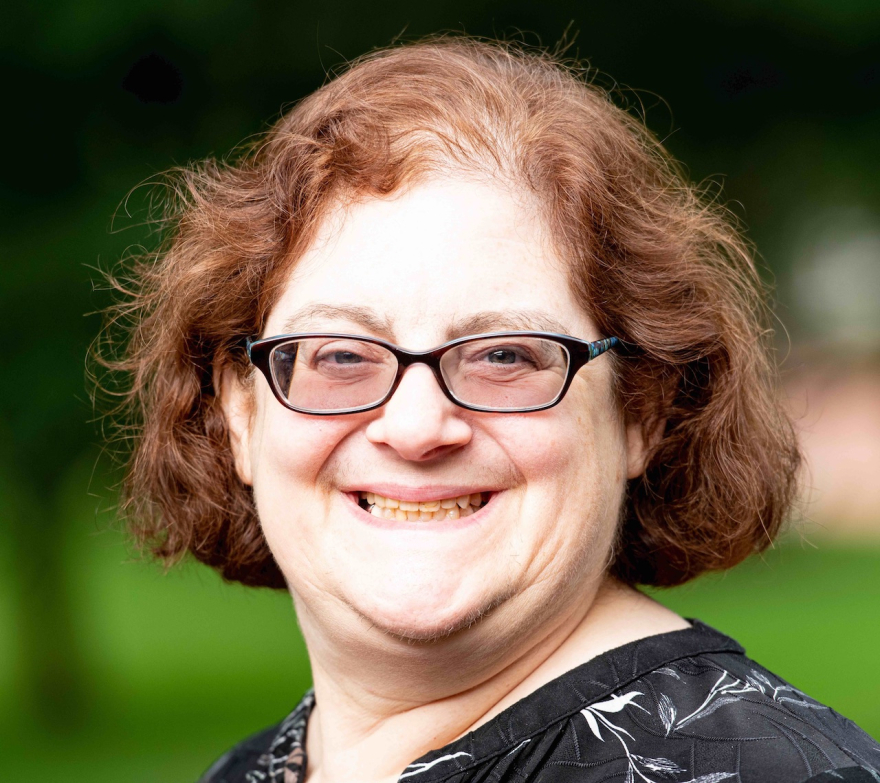Random Thoughts from Debbie
Hi Deborah,
As I watched the latest activity this week in the U.S. House of Representatives, which included barely passing a continuing resolution to fund the United States government and the services it provides (including research) as well as the ouster of the Speaker of the House, I thought of the difference between politics and policy -- a question I get quite often.
Policy is a "law, regulation, procedure, administrative action, incentive, or voluntary practice of governments and other institutions. Policy decisions are frequently reflected in resource allocations." From a "policy for science and technology" perspective, these policies might pertain to research funding, ethical guidelines, technological innovations, regulations, and data protection, to mention a few. Policy establishes what is intended to be achieved and how to take the accompanying actions and might be established at various levels, including organizational, local, national, or international spheres.
Politics are the "processes that define, produce, and distribute power, authority, and values." Politics involves debates, negotiations, policy-making, and analysis of the governmental framework. The interplay between politics and policy in science and technology often hinges on aspects like innovation, ethical considerations, economic growth, national security, and social well-being. Political agendas and ideologies can shape the policies that determine the directions and priorities of scientific research and technological development.
In essence, while policy and politics are intertwined and influence each other, policy is more about the "what" and "how" of organized actions, whereas politics is more concerned with the governance mechanisms, power dynamics, and decision-making processes that determine the policies in place.
I think that scientists and engineers often think they are above politics, but I don't see the situation that way at all. And more importantly, neither does the American public. An October 3, 2023 New York Times commentary entitled "Why So Many Americans Are Losing Trust in Science," states that
"According to new survey data, 69 percent of Americans this past May said they had confidence in scientists to act in the public’s best interest, compared with 86 percent of Americans who told the Pew Research Center in a similar survey that they had confidence in scientists in January 2019."
This article is based on an American Enterprise Institute analysis that said the following:
"There appears to be a pervasive belief among many Americans that partisanship and other special interests have politicized and corrupted science."
This is not the first time I've heard something like this, even before the pandemic, but it seems (like many pandemic trends) to have exacerbated the speed of the decline in America's confidence in science.
So, what can we do about it? First, I think we need to recognize that we all have unconscious biases that influence our view of the world. Unconscious bias is not just related to issues of race and ethnicity, but our other perspectives of the world such as degree of education, U.S. regions, and scientific and technical elitism. Second, we need to interact more with the "real world" as opposed to staying within our own "ivory towers." And scientists and engineers who do this should be rewarded not penalized for taking the time to do so. This does NOT mean filling a "knowledge deficit" but rather working in partnership with members of the public to respond to societal challenges.
Cool Resources
So, how do you learn more about politics, particularly in science and technology? Besides watching episodes of the West Wing, here are some useful (and more recent!) resources that, in many cases, will challenge your thinking.
-
Holden Thorp is the editor-in-chief of Science magazine and Chancellor-Emeritus of UNC-Chapel Hill. I appreciate his thoughtful and honest commentaries, many of which get into the issue of politics in the world of science and technology. You can read his perspectives via his substack blog or his Science editor's blog, I particularly enjoyed this one called "Value the STEM teaching workforce," where he said
-
"Most of the ills that attend science today—racism, sexism, and homophobia in the science workforce; underrepresentation of marginalized groups in science; scientific misconduct; political naïvety of scientists; and more—originate in problems with teaching science, technology, engineering, and mathematics (STEM). . . Most institutions would say publicly that research and teaching are equal, but their actions and resource allocation clearly favor research."
-
P.S. I think you could replace teaching with "science for policy" and it would work as well. Just once I'd like "science for policy" discussions to be at the beginning of an event instead of at the end.
-
Roger Pielke Blog, The Honest Broker: For those of you who have taken my S&T Policy 101 class, you might remember the exercise I do where you identify where you are within a spectrum of scientists and their engagement with policy. You can pay for the full version of Roger's blog, but I get plenty out of the free version.
-
Here's an article he wrote based on the AEI study above called "The Public is OK, It's Us Scientists Who are the Problem: The uncomfortable conclusions of a new survey of public trust in science." An excerpt:
"Typically, the idea of a crisis of public trust in science is quickly accompanied by a diagnosis (from us scientists, of course) that identifies the crisis as a failure of the public, e.g., in being easily duped by monied interests or evil politicians, and simply not smart enough to know enough to come to the proper views. This of course is a version of the old deficit model which posits that the public has a knowledge deficit, which if corrected through science communication and education would then lead to changed policy and political preferences — as well as increasing overall public trust in science.
Here I wish to overview an alternative argument that I’ve been making for almost two decades — trust in science (including scientists and scientific institutions) is placed at risk when leading scientists and institutions become politically active in ways that diverge from the values and preferences of the broader public."
-
Roger writes many blog posts of this ilk, particularly regarding climate change science. I encourage you to read his blog, including older posts, if you work in this field, so that you can challenge your thinking. I don't always agree with him, but he does make me go hmm..
- Georgetown University: National Center for Cultural Competency, Conscious and Unconscious Bias in Healthcare: I encourage you to watch Module 3, Bias and Well-Meaning People, which discusses the neuroscience of unconscious bias. The entire video series is great, but I think this particular video really strikes home for scientists and engineers.
-
Open University: What is Politics?: A free class that provides you with an academic perspective on politics.
Did You Know?
Innovate US offers great free educational webinars with experts on a variety of policy-related topics for an audience of primarily state and local government staff, but they are open to everyone. I think you'll find not only the ones I'm offering below, but others very useful in your policy-related activities. I attend them frequently myself and gain a better understanding by hearing from government staff in the field about the challenges they are facing in their policy-related activities.
Beginning tomorrow, you can attend three 1.5-hour seminars throughout October on program evaluation. Although you may have attended one of my workshops on this topic before, this is updated material, and I show how you can use Chat GPT and similar tools to improve the effectiveness, efficiency, and equity of your evaluation. Below are the topics. Register for one or all plus other interesting topics offered by other experts. If you can't make it, you will receive a recording:

Hope to see you there!
More Ways to Learn and Grow
The S&T Policy Academy has a number of ways for you to learn and grow:
-
ON DEMAND CLASSES FOR INDIVIDUALS: Affordable classes you can do at your own pace anywhere. If you are a member of the National Science Policy Network (NSPN), you can get half off and apply for professional development funds that are enough to pay your entire tuition. For each class you complete, you receive a digital badge. Complete all four core classes (Levels 1-4), and you receive a digital certificate.
-
WORKSHOPS, WEBINARS, AND KEYNOTES FOR ACADEMIC AND STUDENT ORGANIZATIONS, GOVERNMENT AGENCIES, & NON-PROFITS: Workshops can cover any science & technology policy topic of interest to the sponsoring organization for any timeframe. Schedule a no-cost, no-obligation consultation on my calendar or email me at deborah@scitechpolicyacademy.com if you’re interested so we can work together to identify what will work best for your group.
-
CAREER, EXECUTIVE, AND CONSULTING BUSINESS COACHING SPECIALLY DESIGNED FOR PROFESSIONALS AND ENTREPRENEURS IN SCIENCE AND TECHNOLOGY: Our mission is to equip you with the skills and strategies you need to leverage your scientific and technical knowledge to improve society. If you’re interested, please schedule a free consultation on my calendar or email me at deborah@scitechpolicyacademy.com to see if coaching is a “right fit” for you.
-
DONE FOR YOU SCIENCE & TECHNOLOGY POLICY ANALYSIS, PROGRAM EVALUATION, & COMMUNICATION: If time and staff are limited or you just want a third-party perspective, and you are a non-profit or academic organization, industry, or business who needs a project in policy analysis, program evaluation, or communication, then the Science & Technology Policy Academy can work with you or your team to get that project done. We can gather existing and new information via research, surveys, interviews, focus groups, or roundtable discussions with experts or stakeholders to develop a policy analysis, program evaluation, or data analysis. We can then produce communication products such as policymaker guides, policy briefs, case studies, videos, and infographics. Want to chat further to see if we’re a good fit for each other? Then please schedule a free consultation on my calendar.
Thanks for reading!
 Dr. Deborah D. Stine, Founder, Science & Technology Policy Academy Dr. Deborah D. Stine, Founder, Science & Technology Policy Academy
|